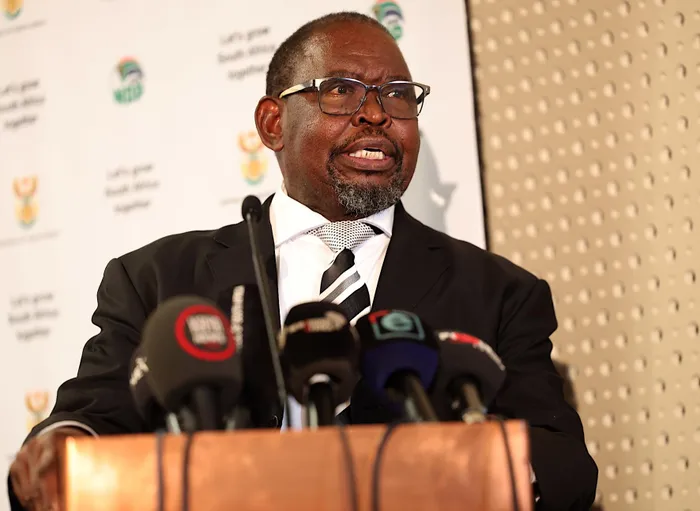Coalition politics and budget cuts: What to expect from Godongwana's upcoming speech
BUDGET 2025

Minister of Finance, Enoch Godongwana briefing media on the 2025 Budget Process.
Image: Supplied / GCIS
While there have been calls for Enoch Godongwana to resign, South Africa's Finance Minister announced this past week that a third Budget Speech will be taking place later this month, on 21 May.
The announcement came after the 0.5% Value Added Tax (VAT) reversal, which was proposed in the March 2025 Budget, with the matter being taken to court by the Democratic Alliance (DA) and Economic Freedom Fighters (EFF).
Earlier this year in February, the minister's first budget attempt was thwarted by political parties in Parliament, as the minister proposed a larger VAT increase of 2%.
Godongwana said that the Budget of 12 March 2025 and the proposed VAT increase sparked rigorous debate.
“This is welcomed in a healthy democracy. Today there is clarity that VAT will remain at 15%. This decision was shaped not only by political debate but by the voices of the South African people. When people speak we must listen. I'm encouraged by the passion shown, and it reflects the seriousness with which we approach the hard choices needed to place our finances on a sustainable path.”
Godongwana added that we are all new in South Africa to what is called coalition politics.
“There are lessons to be learnt by cabinet, legislature and ourselves. I'm pleased that we have agreed that we will balance the budget without raising VAT while protecting vital sectors such as education, health, and social grants,” he said.
Frank Blackmore, lead economist at KPMG shared his thoughts with Business Report on what he thinks Godongwana's re-tabling of the 2025 Budget Review for the economy.
Blackmore said, "The comprehensive review will include the Fiscal Framework, Appropriations Bill, Division of Revenue Bill, as well as the already tabled Rates and Monetary Amounts and Amendment of Revenue Laws Bills. Given the long delay since the original budget was tabled in February, until the new budget is passed, government services will continue to be funded under Section 29 of the Public Finance Management Act."
He added that this provision also applies, in part, to the funding of provinces and municipalities, it is therefore not the case that these levels of government will be cut off from funding.
"Public services should continue to be rolled out. The Minister also informed us that the National Treasury has begun developing the new fiscal framework to maintain the trajectory towards debt stabilisation, an essential element in strengthening public finances. A key point here is that the Treasury will need to revisit the economic assumptions, using the most recent data available,"Blackmore said.
"I imagine their GDP forecast will be revised down from the 1.9% we saw in the previously tabled budget. This process involves generating updated fiscal projections, recalculating revenue estimates, determining appropriate borrowing strategies, and consolidating these elements into a coherent fiscal framework. It seems that much remains open at this stage, and we will only see the full details on 21 May, by which time, one hopes, agreement will have been reached with all parties that form part of the Government of National Unity (GNU)."
Waldo Krugell, an economics professor at the North-West University, said,
"The work will be done by the Treasury's Budget Office. Economists are keen to see the impact of updated economic growth forecasts and what they mean for tax income and major ratios like debt-to-GDP."
Krugell added that Godongwana has also indicated that borrowing more will not be an option, so there will have to be some spending cuts to the proposals made in Budget 2.0.
Siyabonga Ntombela, University of KwaZulu-Natal academic and political analyst, warned that the government will attempt to recoup the lost revenue through alternative measures, such as increasing the fuel levy, which will in turn impact food prices.
"Certain goods will all of a sudden cost more. South Africa's borrowing ratings are below investment grade. The government will have to put some austerity measures to keep the country afloat," Ntombela said.
BUSINESS REPORT